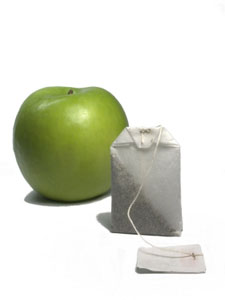Common Health Questions


Outside of the general questions about tea, there are a handful of common health questions that keep popping up when talking with tea buyers. This lesson attempts to identify and answer the most common of these.
What is Wulong or Wu-Yi tea and will it help me loose weight?
Wulong tea, as it has been marketed in recent years, is simply a marketing gimmick and is no more likely to lead to weight loss than any other tea. Tea is very good for you, but there is no reason to overpay just because some celebrity endorsed it or because they have impressive before and after pictures of models.
How many calories are in a cup of tea?
Most teas will have 1-2 calories resulting from ingested plant matter. Fruit teas may have as many as 8 calories. Frankly we consider this a non-issue. The health benefits of all teas (classic or fruit) are considerable. No one would think to question the calorie content of a head of broccoli!
What is the best "detox" tea?
This question has been asked in relation to everything from a bad hangover, to a disturbed aura, to a recent cancer diagnosis. Without making inappropriate claims, we can easily say that the antioxidants in tea and tisanes are prized for their ability to protect our bodies from Free Radicals, which can damage cells, cause inflammation and promote disease. In addition, the pleasant warmth and aroma and stimulative effects of caffeine and L-theanine combine to make most people feel better after a good cup of tea.
In the end there is no "best" detox tea, but some of the teas with the highest content of healthy elements include white teas (especially Silver Needles) and green teas (especially Gyokuro or Matcha).
Do any of your teas contain allergens?
For Adagio the answer is no. None of our teas contain nuts, lactose, or gluten.
Does adding things to my tea affect the health benefits?
In some cases.
Lemon, in addition to containing vitamin C (an antioxidant) itself, actually increases your body's ability to absorb the antioxidants in the tea. Other citrus fruits have similar impact.
Milk or cream MAY reduce the body's ability to absorb the antioxidants in tea. To this point, the research is offering conflicting reports. The theory is that the proteins bind with the antioxidants and, in some patients, this has been found to completely negate the antioxidant effect. In other studies, no impact has been found.
Is tea dehydrating?
No. Caffeine is a mild diuretic for people who do not regularly drink caffeine, but this effect does not present itself in regular coffee or tea drinkers. Regardless, tea is 99.5% water, and any impact of the caffeine on hydration even in non tea-drinkers would be practically imperceptible.
Is tea acidic?
Slightly. The water you use will have a great deal of impact on the answer. Pure water has a pH of 7, and anything less is acidic. Cola has a pH of 2.5, orange juice 3.5, and black tea approximately 4.9.
Why does tea cause some people stomachaches?
There are two compounds in tea that can be rough, especially on a sensitive and empty stomach. Caffeine can cause heartburn and acid reflux. Polyphenols (aka flavonoids or antioxidants) can bind with stomach enzymes and cause discomfort in some people.
Does tea contain fluoride?
Yes. Tea is a natural source of fluoride, which improves tooth and bone health. That said, tea contains much less fluoride than is added to the water in most municipalities. Even consumption of 10 cups per day of most teas would not lead you to take in more than the recommended daily allowance of fluoride.
Does tea contain tannins?
Yes, but not in the sense that myth has led people to believe. Tea does not contain tannic acid (which is what many who ask this question are actually concerned about). Polyphenols fall into one of two groups - flavonoids and tannins. Flavonoids are found in tea, and certain fruits and vegetables. Tannins are found in other fruits and vegetables including grapes, cocoa and apples and oxidized teas. Both flavonoids and tannins create similar astringent, dry-mouth sensations.
Should pregnant women avoid tea?
The answer to this depends on your doctor. Some doctors recommend cutting out all caffeine, which would obviously preclude traditional teas. In addition, the antioxidants in tea cause a minor disruption in the body's ability to absorb folate and iron, both important for fetal development. In cases of women who already enjoy a healthy diet, the benefits of tea generally outweigh any concerns. If you'd rather be 100% safe, consider tisanes.
Can tea cause iron deficiency?
Because tea causes a minor disruption in the body's ability to absorb iron, individuals with iron deficiencies may want to limit tea intake. However, for most individuals with a balanced diet and no history of iron deficiency, the benefits of tea far outweigh any potential risks relating to iron.
 teaclass
teaclass
